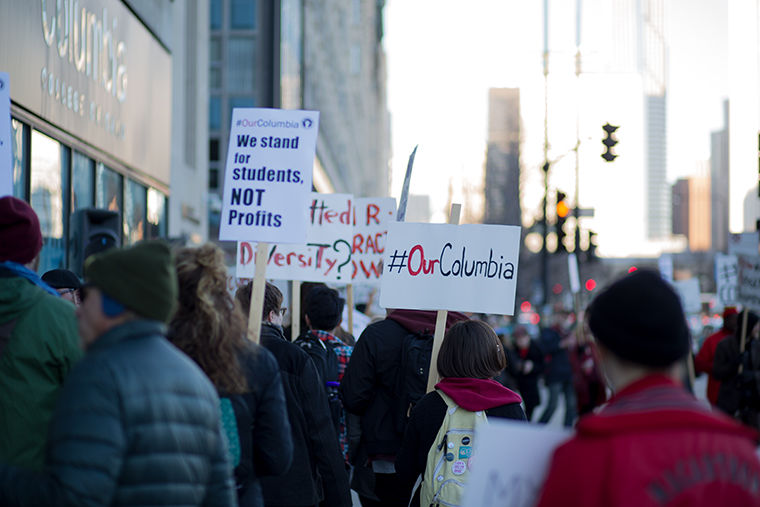P-Fac strikes, back to bargaining
December 4, 2017
In the midst of bargaining over a new union contract, part-time faculty union members, joined by students, protested what they called “bad faith bargaining,” unfair labor practices and other collective bargaining complaints by walking out of classes Nov. 29–30 and picketing on Michigan Avenue.
P-Fac President and Adjunct Professor in the Photography Department Diana Vallera announced the union’s consensus to strike was affirmed by an 86.2 percent vote from P-Fac members in a press release sent to The Chronicle Nov. 22. The email stated more members had voted than ever before but did not disclose what percentage of members voted or how many adjunct professors are in the union.
Over the two days, union members and students, who created the OurColumbia coalition, as reported Nov. 12 by The Chronicle, donned union red and marched outside the 600 S. Michigan Ave. Building, where the provost and president’s offices are located. The strike received support from Democratic governor candidates Chris Kennedy and Daniel Biss, as well as Vice President of the Chicago Teachers Union Jesse Sharkey.
“I’m happy about the support. I’m not happy that we are on strike, but honestly, sometimes you get to the point where this is what you can do collectively to be heard,” Vallera said. “I am really pleased that our members, [86.2] percent [who] voted in favor, and students are here because we share some of the same interests. Obviously, we are here because the quality of the education is going down here at Columbia, and it affects all of us.”
Vallera said the college should not only begin to bargain in good faith but also realize that a great deal can be accomplished if the two groups work together.
“If you can’t sit down and say, ‘These are my interests, what are yours, let’s try and figure out something,’ then it’s a waste of everyone’s time. That’s why legally it is a violation if you don’t have [decision-making] authority,” Vallera said.
Senior Vice President and Provost Stan Wearden said when the college first started bargaining with the union this fall, and both parties had submitted their interest statements, progress in the bargaining slowed.
“We felt that there wasn’t any kind of substantive progress being made,” Wearden said. “So we came forward with—I don’t want to call it a comprehensive proposal because it didn’t cover everything—but a very thorough and broad proposal, assuming that they would look it over, would respond and [they] would counter maybe with a proposal of their own. We didn’t expect that they would like or accept everything in it.”
Vallera said the proposal was regressive and stripped many of the rights the union gained when bargaining over its last contract.
Laurent Pernot, chief of staff and college bargaining representative, said the administration proposed a 2 percent pay increase and sought greater flexibility in the way courses are assigned to adjunct faculty members, by allowing the administration to assign courses for less than 10 percent of classes without seniority.
“What happens now is that we may have someone who has not taught here before who may be a great addition to our core of adjunct faculty,” Pernot said, “but we can’t give them a class because the system is such that we can only give them to people who have been here a long time.”
Adjunct Professor in the Theatre Department and P-Fac member Joe Janes said during the strike that some of the reasons he participated in the two-day strike was the decrease in courses offered at the college, an increase in class sizes and a lack of benefits for part-time faculty members.
“What I hope is that [the college] realizes we are 70 percent of the faculty; we’re the product, we’re the reason students come here and the reason they get a quality experience, and we’re not feeling valued,” Janes said.
Pernot said the college would like nothing more than to sit down with the union and participate in good faith bargaining.
“This strike is regrettable,” Pernot said. “We’ve been at the negotiation table, we hope that the union comes back from the strike at the negotiation table to help us resolve this issue. There is no question that this affects the students and this affects Columbia as a whole, but these are important issues. They’re important issues that we are having a conversation about in negotiations that help us, we hope, forge an even stronger and better quality institution for the future.”







